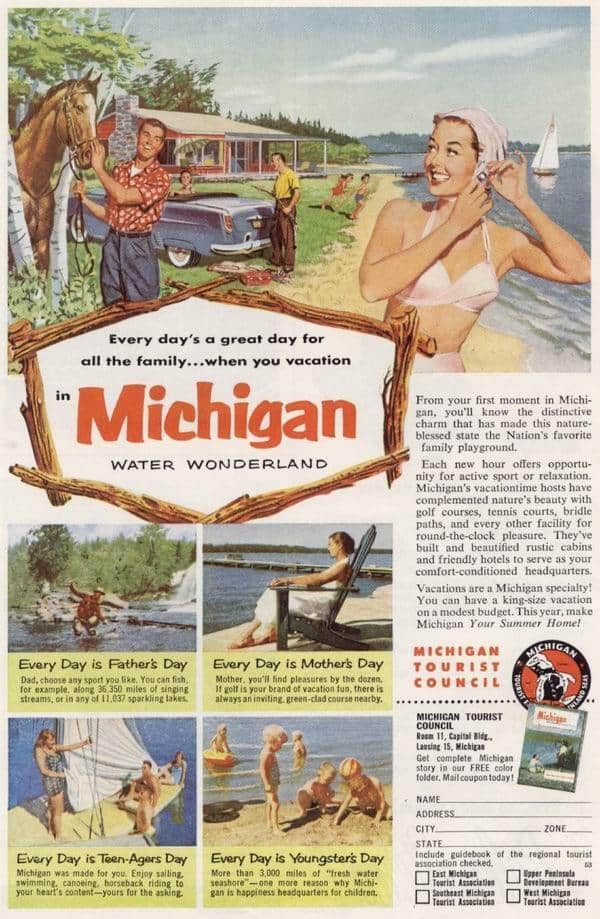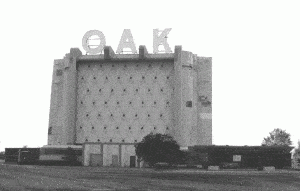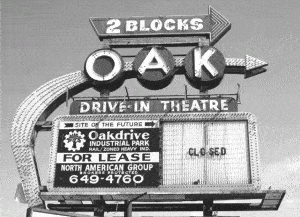D-Day on the Radio
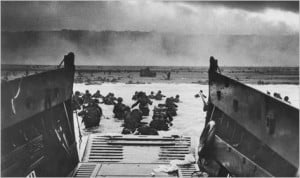 On June 6th, 1944, there was no CNN, no Twitter or Facebook and the task of covering one of the biggest news stories of the century became radio’s challenge. The gargantuan task of reporting the D-Day landings in France [image] lead to the invention of the pool broadcast, where every network’s correspondents filed stories for broadcast across all webs. It was one of the first times that recorded news actualities were allowed to air. Prior to D-Day the networks had policies (and technology) that required news broadcasts to be live.
On June 6th, 1944, there was no CNN, no Twitter or Facebook and the task of covering one of the biggest news stories of the century became radio’s challenge. The gargantuan task of reporting the D-Day landings in France [image] lead to the invention of the pool broadcast, where every network’s correspondents filed stories for broadcast across all webs. It was one of the first times that recorded news actualities were allowed to air. Prior to D-Day the networks had policies (and technology) that required news broadcasts to be live.
The CBS coverage of the first 48 hours after D-Day has been preserved and is in circulation among Old Time Radio collectors. In celebration of this historic day, here are three hour-long segments, starting before the official announcement and running through dawn. You’ll hear some amazing accounts by reporters who helped to define radio news for a generation.
CBS D-Day Coverage Part 1
CBS D-Day Coverage Part 2
CBS D-Day Coverage Part 3
Learn more about how radio covered D-Day HERE. And you can follow D-Day as it happened on Twitter.
Mrs. Burke! I thought you were Dale!
Courtesy of Keenerfan Jeff Smith, the classic Grape Nuts commercial from the 60s that most of us either loved or hated.
Happy Birthday Herb!
 Herb Alpert turns 78 today.
Herb Alpert turns 78 today.
Charting multiple times on the WKNR music guide, Herb enjoyed five national number ones, eight Grammy awards, fourteen platinum and fifteen gold LPs. With more than 70 million album sales worldwide, Herb Alpert is the only recording artist to hit number one with both an instrumental and a vocal. Oh yeah.. He and partner Jerry Moss are the founders of A&M records, too.
Alpert’s musical accomplishments include five number one hits, 28 albums on the Billboard charts, eight Grammy Awards, fourteen Platinum albums and fifteen Gold albums.
Happy Birthday, Herb!
http://www.youtube.com/watch?v=hkK04szvPf8
Pure Michigan, in the Keener Era
The Instamatic
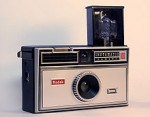 One of the other new brands that was launched in 1963 (besides WKNR) was the Instamatic Camera. These were the first cameras to utilize Kodak’s new 126 format. It was an easy-to-load film cartridge that contributed to the camera’s low production cost. A wide variety of print and slide film for the Instamatic was sold by Kodak in the 126 format.
One of the other new brands that was launched in 1963 (besides WKNR) was the Instamatic Camera. These were the first cameras to utilize Kodak’s new 126 format. It was an easy-to-load film cartridge that contributed to the camera’s low production cost. A wide variety of print and slide film for the Instamatic was sold by Kodak in the 126 format.
Following the tradition of Kodak’s famous Brownie camera, the Instamatic had a fixed shutter speed, aperture and focus, making it one of the easiest point-and-shoot cameras on the market. As it’s design improved the original built in flash gun was replaced by a four shot flash cube.
The product was an instant success with more than 50 million Instamatic cameras produced between 1963 and 1970. There was even an Instamatic movie camera that was the first to use the new Super 8 film format. After a number of design enhancements, the Instamatic brand left the marketplace in 1988.
Here are two vintage Instamatic TV commercials, the first introduces the Flash Cube..
http://www.youtube.com/watch?v=sYPci1FEzc0
The second, features a future Skywalker in an early acting role.
Keener Pop Culture Icon: Vic Perrin
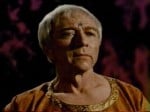 One of the pop culture personalities of the Keener generation was actor Vic Perrin. He appeared on just about every TV series there was during the Keener era, guesting on Dragnet, Peter Gunn, Black Saddle, Gunsmoke, The Untouchables, Going My Way, Perry Mason, Adam-12, Mannix, and Mission: Impossible. He has two significant sci-fi credits, including a role in three classic episodes of the original Star Trek and the disembodied Control Voice on the Outer Limits (“We will control the horizontal. We will control the vertical..”). A prolific voice actor during radio’s golden age, Perrin’s voice is familiar to Jonny Quest fans. He played many a villain during the series run, including Dr. Zin.
One of the pop culture personalities of the Keener generation was actor Vic Perrin. He appeared on just about every TV series there was during the Keener era, guesting on Dragnet, Peter Gunn, Black Saddle, Gunsmoke, The Untouchables, Going My Way, Perry Mason, Adam-12, Mannix, and Mission: Impossible. He has two significant sci-fi credits, including a role in three classic episodes of the original Star Trek and the disembodied Control Voice on the Outer Limits (“We will control the horizontal. We will control the vertical..”). A prolific voice actor during radio’s golden age, Perrin’s voice is familiar to Jonny Quest fans. He played many a villain during the series run, including Dr. Zin.
But did you know that, even after his death, he has saved thousands of lives? Perrin is the voice that provides audio instructions for all Automatic External Defibrillators, the ubiquitous “AEDs” we see at airports and other public venues. (With thanks to Steve Richey)
Crosby, Stills and Nash turn 44
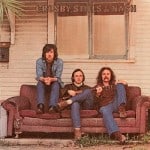 44 years ago this week. Crosby Stills and Nash released their first album as a trio. There are conflicting stories of how these alumni of Buffalo Springfield and the Hollies got together, but the one I like best is that it happened at a party at the home of Mama Cass Elliot. It is said that she heard them harmonizing as rock musicians often did back in the day, and suggested that they ought to make a record.
44 years ago this week. Crosby Stills and Nash released their first album as a trio. There are conflicting stories of how these alumni of Buffalo Springfield and the Hollies got together, but the one I like best is that it happened at a party at the home of Mama Cass Elliot. It is said that she heard them harmonizing as rock musicians often did back in the day, and suggested that they ought to make a record.
Before they knew it, they had a gig, performing at the legendary Woodstock Music and Art Fair, the one we all saw on the big screen in 1969. And here’s what happened.
When Lightbulbs Were Free
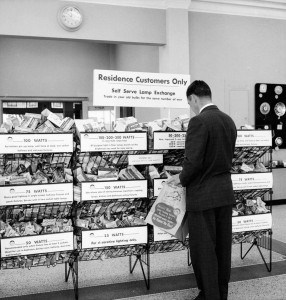
Remember when you could exchange light bulbs for new ones, for free at Detroit Edison? They also repaired small appliances for a time.
Detroit native Robbi Laker-Tall remembers how a lawsuit changed all that. “There was a hardware guy who claimed the free exchange impeded on sales (unfair competition) he sued & won. Almost 100 years of a good thing came to an end.”
Remembering The Oak
We’ve been talking about memorable drive-in theaters in the Detroit area on the Keener Facebook Page. Keenerfan Frank Hartge writes, “We used to go to the Oak in Royal Oak. If I remember correctly, my dad took us to see Voyage to the Bottom of the Sea there, among others.”
Pam Bakka was a senior at Birmingham Groves High in 1966 when she got in trouble with her father for staying out till 3:00 with her then boyfriend, Larry, “because we saw two shows in a row when we were 18!”
K. Thornton, writing at the WaterWinterWonderland.com website remembers,”numerous visits there with my parents as a child I can still feel the excitement as we drove there from Ferndale, and smell the popcorn and food from the concession stand, (along with the oil smell from the gravel). I played on the playground too many times to count, and would give anything to be able to have those kinds of places back Theaters are nice in Michigan winters, but nothing will ever take the place of the smell of of a warm summer night at the drive-in, just before you drift off to sleep in your pajamas in the backseat of a ’68 Fairlane or ’73 Gran Torino.”
Rochester native Steve Brown concludes, “No doubt the best one was The Oak. Big and majestic looking with those pillars on each side of the screen. I think you actually drove in and paid underneath the screen!…Next best was The Troy Drive-in.”
Ahh.. the good old days!
Two Keener Hit Makers Re-Record a Classic
John Fogerty and Bob Seger recording “Who’ll Stop the Rain” for John’s “Wrote a Song for Everyone” CD.
The T.A.M.I Show – Uncut
In 1964, American International Pictures released what would become the precursor to the Woodstock film and the music video. It included performances by many of the most popular rock acts from the United States and England. Directed Steve Binder and his crew from The Steve Allen Show, the program was recorded using a precursor to High Definition television, invented by the self-taught “electronics whiz,” Bill Sargent. “Electronovision”, as it was called, captured more than 800 lines of resolution at 25 frames per second. The format could be easily converted to film via kinescope recording an enhanced resolution that made it possible to enlarge it for the big-screen. Here it is, uncut and in high quality.
17 One Season Sitcoms from the 60s.
Remember Our Man Higgins, Dickens and Fenster, Baileys of Balboa, Mickey, No Time for Sergeants, Wendy and Me, Karen, Tammy, Gidget, My Mother the Car, Captain Nice, Pruitts of Southampton, Ugliest Girl in Town, Occasional Wife, Love on a Rooftop, He & She, Good Morning World?

